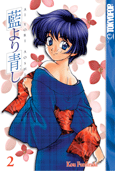|
The Manga Invasion
by Mike Baron For decades comic fans and pros have lamented the static nature of the market place. There appeared to be one million comic readers in the United States, period. And most of those were men. The break-out success of cinematic blockbusters such as Superman, Batman, and Spider-Man never seemed to translate into a larger audience for the periodicals. 

© 2005 Tokyopop Guess what, boys and girls. It's happening, and it has nothing to do with Hollywood. Manga, or Japanese-style comic books, are the fastest growing segment of the comic book periodical business by far, and they have achieved this distinction by going after a heretofore unobtainable demographic: teen age girls. Go into any Borders or Barnes & Noble. You won't see traditional comic spinners, but you'll see spinners and end caps dedicated to manga, particularly Tokyopop and Viz, the two leaders in the field. They will soon be joined by DC, which is launching its CMX imprint this fall. Dark Horse has been selectively and successfully publishing some of the better Japanese manga since Lone Wolf and Cub, and currently publishes hits such as Trigun and Hellsing. Del Rey's Tsubasa, from Clamp, Japan's leading women's art collective, was the third best-selling manga property last year. There are several reasons for this sudden explosion in manga. One is our continuing interest in all things Oriental. Two is the exposure of Japanese anime on the Cartoon Network and Adult Swim, introducing new characters and concepts in such a way that viewers want more. Three is the particular appeal manga has for women. American superhero comics are driven by conflict. Japanese relationship comics are driven by friendship. Guys don't want to see a group of kids come together and make nice. Girls do. Of course the majors have been trying to capture that elusive demographic for years, retooling Wonder Woman, playing with Elektra, to no avail. Girls were suspicious of the characters' roots. You could dress them up, but you couldn't hide the capes, weapons, or ignorant tough guy attitude. The manga titles with their enormous eyes and focus on relationships are inherently appealing to women. It is also possible that men and women respond differently to visual stimuli, and the dynamic, detailed art that so attracts young men to comics is off-putting to women. Manga, with its simplicity of design and enormous eyes, is friendlier. Of course Harvard University President Lawrence Summers ran into a shit storm of liberal outrage when he suggested something similar in the sciences, but Larry and I can take the heat. Japanese manga follows a well-established pattern: individual titles, anthologies, tonkoubons (collections), anime, and toys. Booksellers will have to make room on their shelves for Korean manwah as well: companies such as ICE Kunion are about to invade the United States with Angel Diary, Chocolat, Bring It On, and The 11th Cat. Look for an 11th Cat fight between Japanese and Korean titles. The Old Switcheroo Mike Norton and I began Night Club with the best of intentions. It was intended to be a monthly. Ha! No sooner did Norton finish the first issue then he landed a gig with Marvel drawing Gravity. Mike's a terrific artist and deserves the gig. Because Marvel pays on delivery, rather than six months after the fact, Norton had to take time off Night Club to put bread on the table. Night Club seemed to have slipped into the same black hole as Detonator. (Detonator #4 and #5 are complete and in Image's sweaty paws. To see the ground-breaking pick-up work Nick Runge did to finish off Detonator #4, go to www.bloodyredbaron.com.) Night Club came out and it was good. A guy named Karim Whelan sent in a pin-up. The pin-up was phenomenal. I asked KW if he did continuity. He did, and he does. KW is largely responsible for Night Club #2, and will draw #3 as well, with Norton coming back for the grand finale. To see Karim's work, go to my website. Go. Go now.
Visit our Comic Book News Archive. |
